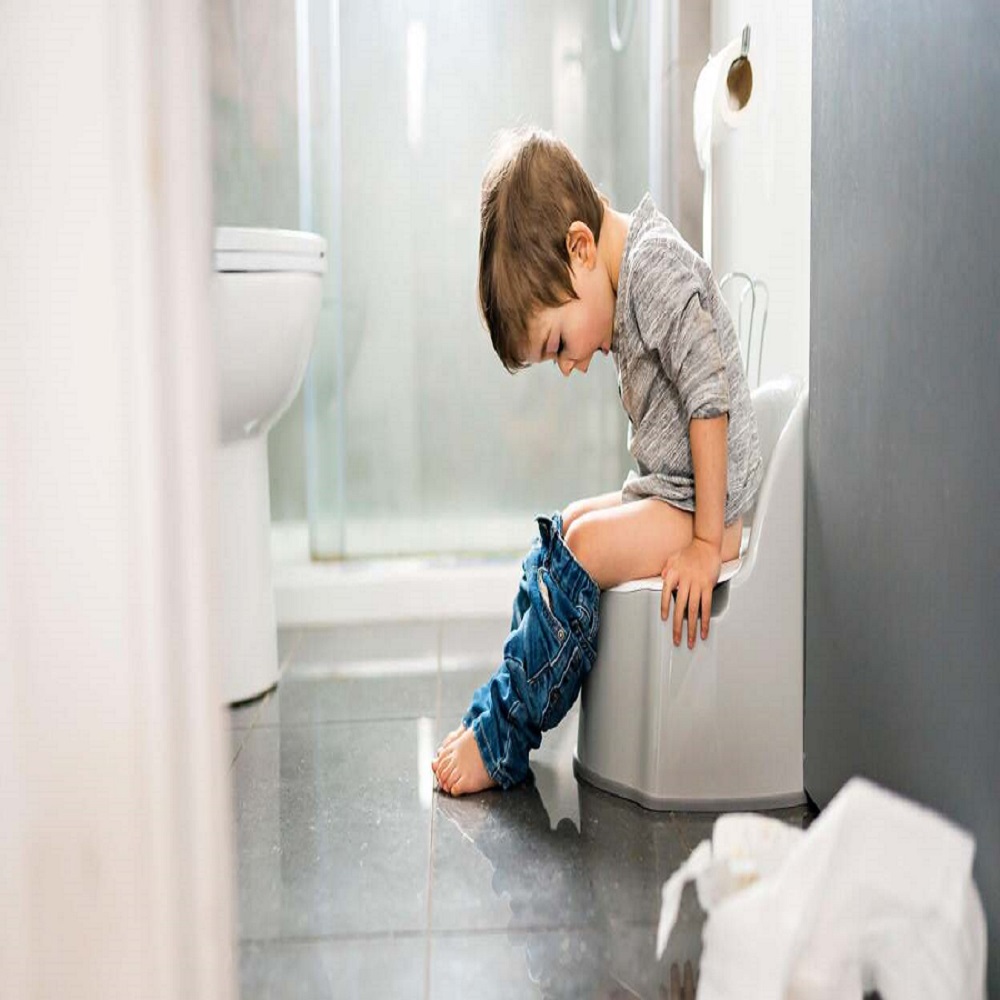Recognizing the Signs of Constipation in Toddlers
When a toddler has trouble going to the bathroom, you might notice certain signs. Fewer dirty diapers could mean constipation. If you can’t recall when your toddler last pooped, this might be it. Watch for other clues. Your toddler might poop less often, show less hunger, say their stomach hurts, have a tough poo, or work hard to poo. If these signs seem familiar, try some home remedies for quick relief. And always, if worried, call your child’s healthcare provider.
Symptoms & When to Contact a Pediatrician
The American Academy of Pediatrics offers guidelines. If a toddler poops less than once every two or three days, call the doctor. Also, if they find it painful to poo, or if pooping gets in the way of daily activities, reach out. Over two weeks of constipation is a sign too. As is too much strain during bowel movements. At any of these times, get in touch with your pediatrician for advice.

Common Causes of Toddler Constipation
Understanding the common causes of constipation can help parents address and prevent this uncomfortable condition. Let’s explore some factors that contribute to toddler constipation.
Dietary Factors and Their Role
A toddler’s diet plays a pivotal role in their bowel movements. Low fiber intake often leads to constipation. Toddlers require about 14 grams of fiber daily for healthy digestion. However, many toddlers consume less fiber than needed. Also, not drinking enough water can lead to dehydration, making the stool hard and difficult to pass. Processed foods are usually high in sodium and low in fiber, which can worsen constipation. Too much milk or dairy can also be a culprit, as it can be binding for some children.
The Impact of Routine Changes and Illnesses
Alterations in a toddler’s life, such as starting daycare, traveling, or potty training, can disrupt their regular bowel habits. Stress from these changes may lead to withholding stool. Illness, like a cold or stomach bug, might decrease a child’s appetite and alter their regular bathroom patterns.
Behavioral Reasons for Constipation
Toddlers may hold in their stool on purpose. They might not want to interrupt their play, or they may feel uneasy using the potty. If a child has had a painful experience while pooping, they might try to avoid it in the future. Some toddlers are going through potty training or significant life transitions, which can bring about controlling behavior regarding their bowel movements.
Lactose Intolerance and Its Connection to Constipation
Lactose intolerance may not be the first thing you think of when your toddler is constipated. Yet, it’s worth exploring. This condition makes it hard for the body to break down lactose. Lactose is a sugar in milk and dairy products. If your child is lactose intolerant, they might avoid dairy. But they then might choose foods low in fiber, such as plain pasta or white bread. These foods can lead to constipation.
Mostly, lactose intolerance causes symptoms like diarrhea, not constipation. Make sure to talk to your pediatrician if you notice digestive issues in your toddler. They may want to check if lactose intolerance is playing a part. If your child does have lactose intolerance, add more fiber to their diet. Look for lactose-free alternatives that still offer nutrition. Remember, it’s not just about cutting out lactose. It’s about finding a balance that keeps your toddler’s digestion moving smoothly.
Home Remedies for Treating Toddler Constipation
When your toddler is having a tough time in the bathroom, simple home remedies can help. These remedies are safe and you can do them at home. They focus on diet changes and physical activity. These can ease your toddler’s discomfort and promote regular bowel movements.
Importance of Fruits, Vegetables, and Hydration
Feeding your toddler plenty of fruits and vegetables is key. They’re high in fiber, which helps digestion. Make sure they drink plenty of water too. This keeps their stool soft, making it easier to pass. Try juicy fruits like oranges and watermelon, and add veggies to every meal.
Movement and Physical Activity
Keeping your toddler active is important. Movement helps their digestion and can prevent constipation. Let them run, jump, and play often. Dancing and swimming are great too. This makes their body work better and can stop constipation before it starts.
Whole Grains and Fiber-Rich Foods
Whole grains are another source of fiber. Foods like oatmeal, brown rice, and whole-grain bread can help. They add important fiber to your toddler’s diet. This fiber moves food through their system and helps them use the bathroom regularly.

Recommended Foods to Alleviate Constipation
When your toddler is constipated, choosing the right foods can make a big difference. Foods rich in fiber, fluids, and certain nutrients can help soften stool and encourage regular bowel movements. Introducing your child to a variety of these foods can provide relief and support their overall digestive health.
Role of Probiotics and Fermented Products
Probiotics play a vital role in maintaining gut health. Fermented foods containing probiotics can help balance gut bacteria. This can improve digestion and prevent constipation. Examples include yogurt and kefir. These products are easy for toddlers to eat and can be mixed with fruits for added fiber.
Effective Natural Laxatives for Toddlers
Natural laxatives are foods that help your toddler poop more easily. Pears, peaches, and plums are great for this purpose. They’re tasty and toddlers usually love them. Also, consider prune juice, which is known for its laxative effects. Always serve juice in moderation and diluted with water to avoid too much sugar intake.
Preventing Constipation in Toddlers
Preventing constipation in toddlers involves attentive care to their diet and lifestyle. Here are some tips to help keep your little one’s digestive system running smoothly.
Dietary Adjustments and Lifestyle Tips
To prevent constipation, try these simple changes in your toddler’s routine:
- Increase Fiber Intake: Add fruits and vegetables to meals and snacks. Think apples, berries, carrots, and broccoli.
- Stay Hydrated: Offer water regularly throughout the day.
- Limit Dairy and Processed Foods: Too much can cause constipation, so keep these to a minimum.
- Encourage Regular Exercise: Playtime, walking, and swimming can help keep things moving.
- Establish a Bathroom Routine: Help your toddler set specific times to try using the potty.
- Offer Whole Grains: Replace white bread with whole-grain options like wheat or oat bread.
By making these changes, you can help reduce the chances of constipation in your toddler. Remember to keep an eye on their bathroom habits and consult a pediatrician if you have concerns.
FAQs on Toddler Constipation
When facing toddler constipation, parents often have questions. Let’s tackle some common concerns with helpful solutions.
Addressing Common Concerns and Solutions
Parents often have questions about how to get their toddlers to poop more easily. Here’s a quick rundown of common concerns and their solutions to help relieve toddler constipation:
- Why isn’t my toddler pooping? Lack of fiber, too little water, and too much dairy or processed foods can lead to constipation. Illness and stress also play a role.
- How can I help my toddler poop? Serve fruits, vegetables, and whole grains to increase fiber. Make sure they drink enough water and stay active.
- Could milk be causing constipation? Yes, too much dairy sometimes leads to constipation. Try reducing milk and cheese intake.
- When should I worry about constipation? If your toddler hasn’t pooped in 2-3 days, seems in pain, or their routine is off, call the doctor.
- How much juice is okay for constipation? A little prune juice can help, but don’t exceed 4 ounces a day. Dilute it with water.
- Can changes in routine affect my toddler’s bowels? Yes, changes like potty training or starting daycare can cause constipation from stress or behavior.

Remember, every child is different. These tips address typical cases, but see your pediatrician if you’re concerned. Keep your toddler’s diet balanced and encourage regular physical activity for best digestive health.
